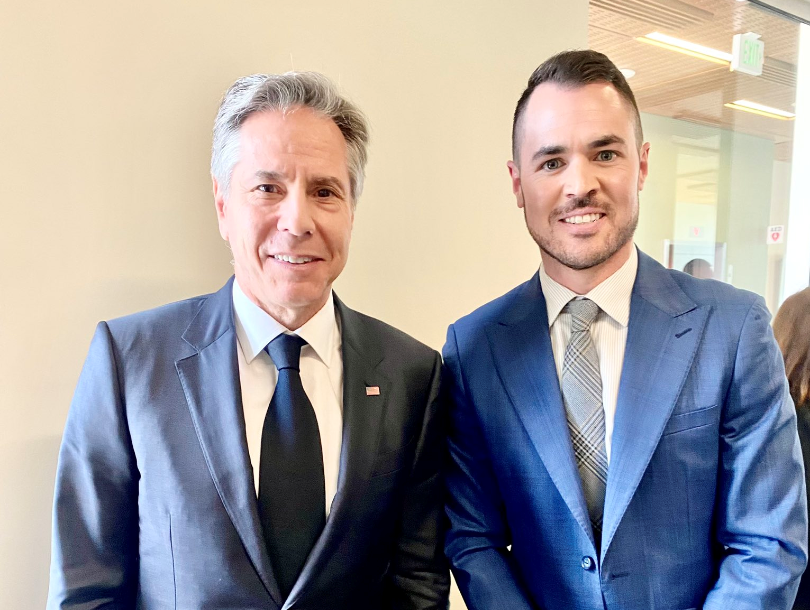Port Coquitlam Mayor Brad West says it has become clearer to him that Canada has fallen behind in its ability to investigate and prosecute transnational organized crime, following a meeting with U.S. Secretary of State Antony Blinken on April 28.
“I spent an hour with Secretary Blinken, so it was a substantive conversation back and forth,” said West of his April 28 meeting in Denver, Colo., at the inaugural Cities Summit of the Americas hosted by U.S. President Joe Biden’s chief foreign affairs adviser.
“I haven't become an expert in that time on everything that the [Federal Bureau of Investigation] has at their disposal, but I certainly came away with a very strong feeling that they are light years ahead of us in their ability to effectively investigate and bring about criminal charges and get convictions,” said West.
West was among four mayors who toured the Denver Crime Lab and discussed his city’s experience with synthetic opioids.
West said Blinken reached out to him due to his outspoken nature on transnational organized crime in B.C. and how it's helping to drive illicit drug deaths in the province.
“President Biden has tasked Secretary Blinken to build a global coalition to target fentanyl traffickers and the money laundering and all the associated crimes that come with it. Because it’s global in nature, [criminals] look for the weak links and unfortunately, for us, Canada is a weak link in this,” said West, pointing to the collapse of two major money laundering investigations (E-Pirate and E-Nationalize), including that of Richmond-based money service business Silver International.
West noted B.C. recently concluded a public inquiry into money laundering in B.C. But at a cost of $18.5 million, the inquiry only produced policy recommendations, most of which have not been acted on more than a year after the final report.
The inquiry focused much of its time on money laundering in casinos. It produced no criminal charges against any person or entity. By comparison, similar findings of an inquiry in Australia last year resulted in one of its largest casino operators being fined $100 million by the government regulator. It also had its licence pulled for 90 days.
“I fear that (Silver International) is just the tip of the iceberg,” said West.
“The sad fact is very few people involved in transnational drug trafficking ever see the inside of a jail cell (in Canada),” said West.
“We seem to be leaning a lot on Americans to prosecute drug traffickers and when that happens, I think something is askew,” said West.
West’s quest not a typical core function of suburban mayor
As mayor of a city of 62,000 people, West says he's largely focused on his municipal duties. But when it comes to international crime and its impact on drug supply, he has often spoken out beyond his post.
“I want to spark a non-partisan coalition of elected officials but more importantly citizens who feel that we need to take action to make sure that our country does not continue to go down the path that it has been, which is the epicentre for fentanyl trafficking, of money laundering and transnational crime,” said West.
One issue West said he will be advocating for, alongside Delta Mayor George Harvie, is the re-establishment of The Ports Canada Police, which was disbanded in 1997, leaving municipal police to patrol docks and ports.
As mayor, West recently backed new bylaws to disallow open drug use in parks and playgrounds. The bylaws needed to change, West said, after the provincial government delisted use of certain illicit drugs from being criminal.
“When the province brought in legislation that allowed for personal use and possession of smaller amounts, the city got legal advice that our existing bylaw would be open to challenge since it relied on provincial statutes that had changed,” said West.
With the new bylaw, it means a bylaw officer can now compel a person to leave a park and playground should they be using drugs.
West said the goal is not to ticket anyone for using drugs or be confrontational toward their choice. Instead, but rather to ensure drug use is not occurring around children and families, or anyone else who wants to enjoy a public park.
“Something is better than nothing and hopefully the province figures out a more uniform approach so there’s not a patchwork of cities doing this or not doing it,” said West.
Case in point
West acknowledged a recent case before the B.C. courts exemplifies U.S. efforts to prosecute Canadian drug traffickers.
Convicted trafficker Tenny Guon Lim, of Vancouver, recently won a judicial review of his U.S. extradition this month.
The B.C. Supreme Court heard allegations from the U.S. Attorney’s Office that Lim orchestrated the transport of MDMA from B.C. to Los Angeles in exchange for cocaine to be transported by a Mexican drug cartel to Vancouver, between 2017 and 2019.
Lim was indicted in May 2019 by a U.S. grand jury for conspiracy to distribute and to possess with intent to distribute controlled substances.
During the time Lim was alleged to be trafficking across the border, he was out on bail, facing separate drug trafficking charges in B.C. after being busted in 2014 at Vancouver International Airport with heroin. Found guilty of those crimes in 2019, at his sentencing hearing the court heard from Lim’s bail supervisor that Lim was “an exemplary client.”
Lim’s co-accused, Vincent Yen Tek Chiu, of Vancouver, had previously been sentenced to 14.5 years in a U.S. prison following his extradition. Chiu was also investigated, but not charged, in a money laundering probe of Richmond’s Silver International money service business.
Another co-accused, Dario Antonio Baruca, was not extradited, as a judge said there was not enough evidence to send him south of the border.



